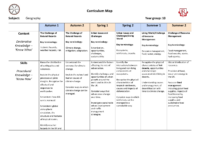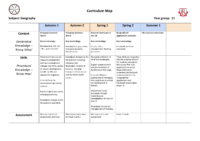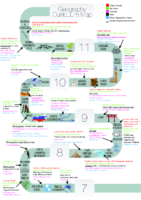Geography
“Geography is the subject which holds the key to our future.”
Michael Palin
At Ridgeway Academy, we aim to provide a Geography curriculum rich in scope and depth; one which demands cognitive and creative application, and inspires students to enquire independently.Welcome to the Geography Department – Subject Leader: Mr M Broad
Key Stage 3
What is Geography? – This unit equips students with a geographical toolkit to frame future study. The toolkit explores the different types of geography, models asking geographical questions and considers what is meant by ‘place’. Students are introduced to the seven continents and five oceans of the world, hemispheres and longitude and latitude.
Where am I? – Learning essential OS Map skills such as grid references, symbols, scale and relief. Pupils develop teamwork by preparing a walking tour for a mystery guest around Welwyn Garden City, ready to present to their peers, demonstrating the various map skills they’ve developed.
Why did Chico leave the Rainforest? – Understanding the differences between major ecosystems before focusing on the tropical rainforest biome. A focus on rainforest strata and adaptation brings in an element of biology before shifting attention towards the causes, consequences and responses to deforestation.
Incredible India – Exploration of this diverse and magnificent country, reviewing map and atlas skills as well as varied landscapes. Development as a concept is introduced with links to population growth and distribution, industry and tourism.
Why does Antarctica Matter? – Studying cold environments such as Antarctica – the history of Antarctica and why Antarctica is important.
Can we safely live in seismic and volcanic regions? – Understanding the plate tectonic theory, types of plate margin and the dangers of seismic events and volcanic eruptions with the use of case studies.
Crumbling Coastlines – Understanding the processes that create the varied coastlines around the UK and the issues related to coastal erosion and warming oceans.
Energy and Resources – Understanding how we use our planet as a natural resource, focusing on oil with examples in the UK and the Middle East. Petrochemical products such as plastics are considered, linking back to oceans before reflecting on sustainable futures.
Weather and Climate – Understanding the difference between weather and climate, the key processes that determine the UKs weather, extreme weather events and the impacts of global warming. An investigation into microclimates provides opportunities to expose students to the fieldwork enquiry cycle.
Japan: ‘The Land of the Rising Sun’ – This unit applies prior learning within a national context, exploring human and physical geographies, such as hazard and energy, and how they are interdependent with wider global processes.
Defining Development – Identifying and understanding the disparity in wealth and development on a national and global scale; seeking to explore patterns of development over time and the impact of inequality on quality of life and standard of living. The Sustainable Development Goals are introduced to clarify the multifaceted nature of poverty.
Russia: A Geography of Opportunity or Challenge? – Exploring the largest country on Earth to consider how the physical geography of the country affects social livelihoods and economic growth. This includes lessons learned from the Chernobyl Nuclear Power Station and concludes by considering Russia’s interest in the Arctic Ocean.
Rushing Rivers – Understanding the long profile of a river, the different landforms found in each course and the impacts of flooding.
Amazing Africa – A journey across this vast continent starts by addressing misconceptions before exploring its physical landscape and climate, considering whether there is any hope for the Sahel. Human geographies of development are revisited, exploring whether tourism in Matmata has changed lives for the better, before exploring China’s relationship with the continent.
A Global Plate – Revisiting the concept of globalisation and development from the the perspective of food production. The topic develops understanding of trade, food miles and sustainability, as well as the causes and consequences of rising food prices.
How parents can support their child’s learning?











